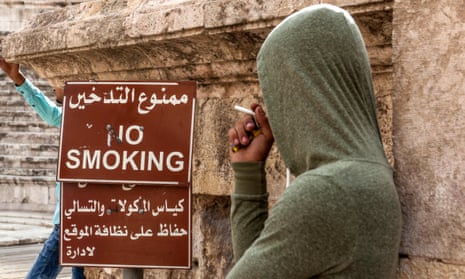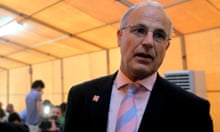The Jordanian government has banned smoking and vaping in all indoor public spaces a week after a Guardian investigation revealed tobacco use in the country had become the highest in the world.
The country’s health ministry said on Wednesday all enclosed public areas would now be “100% smoke-free environments”, building on an existing but widely flouted ban on smoking inside government buildings, and ending an exemption for hotels, cafes and restaurants provided they separated smokers from non-smokers.
Public health campaigners cautiously welcomed the announcement as a major step forward in a country where more than 82% of men smoke or consume nicotine in some form, according to government and World Health Organization data published by the Guardian last week.
“[It’s] a first step to applying the public-health law to combat the scourge of smoking in our beloved Jordan,” said Princess Dina Mired, the president of the Union for International Cancer Control and a member of the country’s royal family, in a tweet. “We hope the smoke-prevention law will be implemented in all public places in its entirety.”
Larissa Al-Uar, from the activist group Tobacco Free Jordan, said the announcement was a “huge change”.
“We’re happy, but we need to see strong implementation of the law. Without that, it will be a disaster.”
She said previous efforts to curb the country’s record-high smoking rates had suffered from weak enforcement as well as what health advocates claimed was widespread interference in policymaking by multinational tobacco companies.
A Guardian investigation found that tobacco company lobbyists had been regularly invited to sit in on meetings to debate regulations on their products, in what campaigners claimed was inappropriate interference in policymaking.
It also found big tobacco had been publicly lauded for paying to refurbish schools, providing students with schoolbags and equipment, and running career development sessions for young people – which anti-smoking activists characterised as an attempt to promote their image.
Tobacco companies including British American Tobacco said their involvement in regulatory debates was appropriate and lawful, and that their charitable donations were driven by a commitment to the community.
Smoking will still be permitted in outdoor areas of hotels, cafes and restaurants under the new regulations. In media interviews over the past week, campaigners have urged the government to focus on enforcing existing smoking bans in a country where tobacco use is linked to one in five deaths, compared with one in 10 globally.
Jordanian men who smoke daily consume an average of 23 cigarettes a day, the 2019 national/WHO survey found.
In its announcement on Wednesday, the Jordanian government cited studies showing that smokers and those who consumed secondhand smoke were more susceptible to harm if they caught coronavirus, a link that Al-Uar hoped would prompt a re-evaluation of smoking among legislators and the public. “We hope that connecting smoking and Covid-19 will have a positive effect,” she said.
Though it borders several countries with significant coronavirus outbreaks, Jordan’s government has overseen one of the world’s most successful Covid-19 responses, declaring earlier this week that the kingdom had effectively ended community transmission of the virus, and that public curfews and lockdowns would be scrapped.









